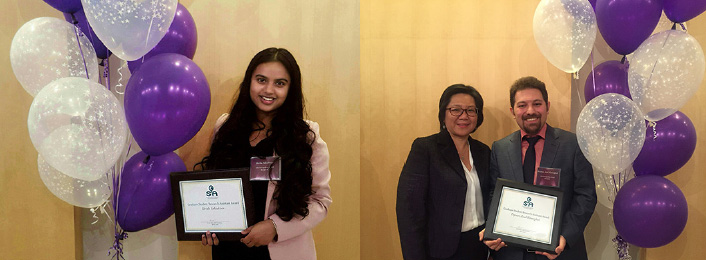
Graduate Student Research Assistant Award recipients: Shrida Sahadevan and Peyman Azad Khaneghah
When Shrida Sahadevan received the e-mail that she had won the Graduate Student Research Assistant Award from the University of Alberta's Graduate Student Association (GSA), the first thing she did was tell her mom.
"I was very excited and I knew my mom would be proud-she's my biggest supporter in everything I do," she says.
The first-year MSc Rehabilitation Science student has much to be proud of. As a research assistant for Esther Kim and Jacqueline Cummine in the Faculty of Rehabilitation Medicine's Department of Communication Sciences and Disorders, she is doing great things in the field of research, particularly on an electroencephalography (EEG) research project studying aging in language comprehension.
"I am really honoured," says Sahadevan. "I love research, and winning this award demonstrates the amount of work and effort I have put in to being a research assistant."
Every year, the GSA recognizes students with outstanding achievements in the field of research, teaching, academic achievement, leadership and service. These students spend countless hours working on research projects, teaching plans, and many other important service-oriented areas in order to complete their programs and help the general community.
Sahadevan was nominated for her award by Kim and Cummine who are also her Master's supervisors. Their research (and also Sahadevan's thesis work) is based on neurophysiological mechanisms behind aging in language comprehension.
"My research project uses EEG, a neuroimaging technique, to investigate whether there are aging effects on reading comprehension, specifically with our ability to use semantic context," explains Sahadevan.
Sahadevan won her GSA award for her initiative in rationalizing unexpected research results related to the EEG project. Not to mention her training of many undergraduate and graduate students on the EEG method, focusing on event-related potential analysis.
"Despite the intense labour involved with EEG studies, these students have been able to successfully collect and analyze this data," says Sahadevan with a smile.
And it's all thanks to her guidance.
But Sahadevan isn't the only one making an impact in research studies in the Faculty of Rehabilitation Medicine. Peyman Azad Khaneghah, another winner of the Graduate Student Research Assistant Award is an occupational therapist currently completing his PhD in Rehabilitation Science. His research is focused on the use of smartphones and tablets to monitor, detect and manage mental health disorders, such as anxiety and depression.
Khaneghah was nominated for the award by his PhD supervisor, Lili Liu, chair, Department of Occupational Therapy. And like Sahadevan, when he was notified that he was one of the successful recipients, the news came as a pleasant surprise.
"I actually couldn't believe it when I received the GSA's e-mail," says Khaneghah. "The good news really elevated my spirit especially since this was during the time I was preparing for my candidacy exam."
As soon as he found out, he knew he had to tell his wife, Ailar, who is a recent PhD graduate from Rehabilitation Medicine and one of his biggest supporters.
"I saw that she was online and I sent her a message," he explains. "She had encouraged me to apply for this award and made sure I did not miss the deadline, so I was sure she would be thrilled to hear the news."
Khaneghah has been involved in various technology evaluation studies within the past three years. These projects deal with the usability evaluation of personal health records for management of chronic conditions, and feasibility assessment of use of GPS technology to track older adults with dementia who are at the risk of wandering. He also won the Graduate Student Principal Instructor Teaching Award last year, which recognizes graduate student instructors who are especially skillful and dedicated to their work.
"The [Graduate Student Research Assistant Award] recognizes my contribution to the projects I have worked on, and it is an encouragement for me to keep up the good work I have done so far."
Both students believe that these awards are important for recognizing the hard work and effort that graduate students put into their studies, research and jobs. It gives them the positive feedback and encouragement to keep doing what they're doing, knowing that it is valued by the university, supervisors and the community as a whole.
For more information on the GSA Recognition Awards, visit gsa.ualberta.ca.